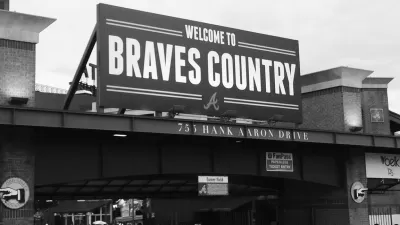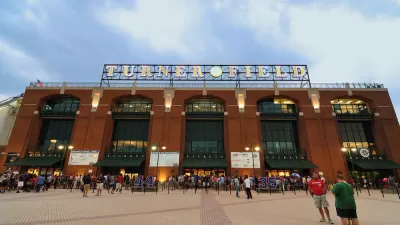Cobb County, Georgia recently approved the "Accessory Special Event Parking" ordinance to limit parking operations around the Atlanta Braves' new stadium.
In February, Cobb County commissioners "quietly passed an ordinance that outlaws property owners within a half-mile of the stadium from charging for parking during games and other special events at the stadium," according to an article by Dan Klepal.
"The ordinance closes off potential revenue for dozens of businesses that own more than 10,000 private spaces — many of which could compete with the team for parking revenue," adds Klepal.
The stadium, which will open next year with the name SunTrust Park, relies on $400 million in funding from Cobb County taxpayers, but the funding hasn't earned much transparency or broader economic development opportunities in return. In fact, writes Klepal, "[f]or thousands of fans, the restriction could mean fewer parking options on game days, making it less convenient or more expensive to go to a stadium with no direct MARTA access." What's more: "The full impact isn’t known because the Braves haven’t yet released their own parking plan."
Dave McKenna followed up on Klepal's reporting, adding an additional case study of a similar use of the lobbying power of professional sports teams to influence land use regulations: the NFL team playing in Washington, D.C. also used a public relations strategy that claims public safety necessity, rather than economic benefit, to explain the need to control parking operations.
FULL STORY: SunTrust Park parking restricted near Cobb County stadium

Planetizen Federal Action Tracker
A weekly monitor of how Trump’s orders and actions are impacting planners and planning in America.

Restaurant Patios Were a Pandemic Win — Why Were They so Hard to Keep?
Social distancing requirements and changes in travel patterns prompted cities to pilot new uses for street and sidewalk space. Then it got complicated.

Map: Where Senate Republicans Want to Sell Your Public Lands
For public land advocates, the Senate Republicans’ proposal to sell millions of acres of public land in the West is “the biggest fight of their careers.”

Maui's Vacation Rental Debate Turns Ugly
Verbal attacks, misinformation campaigns and fistfights plague a high-stakes debate to convert thousands of vacation rentals into long-term housing.

San Francisco Suspends Traffic Calming Amidst Record Deaths
Citing “a challenging fiscal landscape,” the city will cease the program on the heels of 42 traffic deaths, including 24 pedestrians.

California Homeless Arrests, Citations Spike After Ruling
An investigation reveals that anti-homeless actions increased up to 500% after Grants Pass v. Johnson — even in cities claiming no policy change.
Urban Design for Planners 1: Software Tools
This six-course series explores essential urban design concepts using open source software and equips planners with the tools they need to participate fully in the urban design process.
Planning for Universal Design
Learn the tools for implementing Universal Design in planning regulations.
Heyer Gruel & Associates PA
JM Goldson LLC
Custer County Colorado
City of Camden Redevelopment Agency
City of Astoria
Transportation Research & Education Center (TREC) at Portland State University
Camden Redevelopment Agency
City of Claremont
Municipality of Princeton (NJ)




























